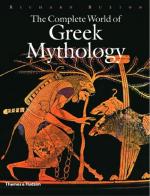|
This section contains 2,509 words (approx. 9 pages at 300 words per page) |

|
SOURCE: "Cosmogony," in The Eternal Drama: The Inner Meaning of Greek Mythology, edited by Deborah A. Wesley, Shambhala Publications, Inc., 1994, pp. 1-17.
In the following essay, Edinger offers a psychological reading of the Greek creation myths, noting the prevalence of the idea that when a being is brought into consciousness, a split into opposites results, followed by conflict between those opposites.
A consideration of Greek mythology must start with at least a brief look at the myths of creation or cosmogony. There are several versions of how the cosmos came into existence. The simplest is that first there was Chaos, and out of Chaos earth, or Gaia, emerged. Gaia gave birth to the sky, or Uranus, and then Gaia and Uranus produced a great progeny. So from Chaos a pair of world parents emerged and separated, who then created all the rest that exists.
What would that mean...
|
This section contains 2,509 words (approx. 9 pages at 300 words per page) |

|


